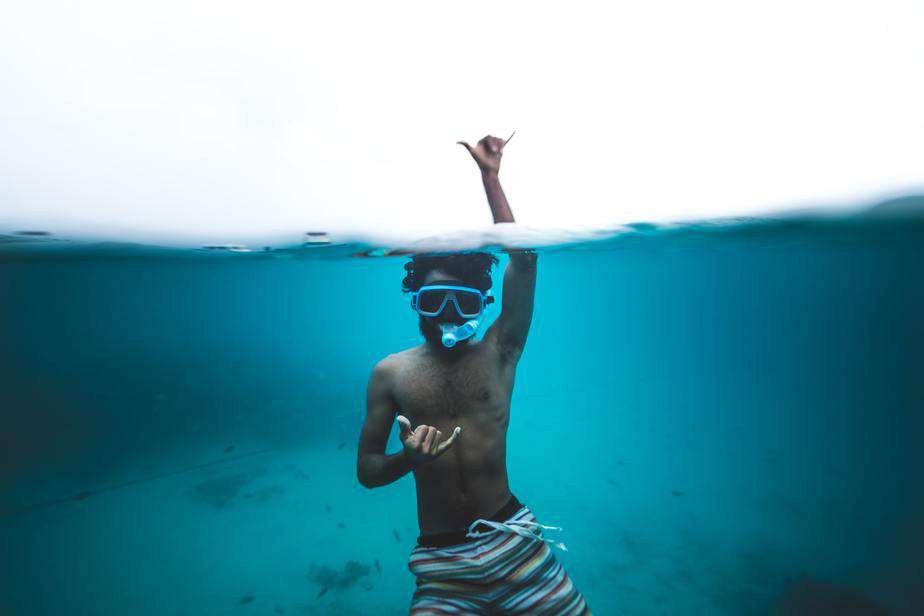Have you gotten a sinus infection after a day of snorkeling? There might be a connection. The ocean is full of bacteria, and if you’ve accidentally swallowed or inhaled sea water, then there is a possibility that the bacteria contributed to your sinus infection. For similar reasons, you may also get a sore throat from snorkeling.
Can snorkeling be the cause of your sinus infection? Yes, there are a few ways that can happen. From inhaling polluted saltwater, using dirty rental equipment, or suffering a pressure-related injury from skin/duck diving, sinus infections are a rare but possible risk of snorkeling. However, in this article we’re going to discuss how you can prevent it from happening so you can enjoy your snorkeling trip in peace.
What is a sinus infection?
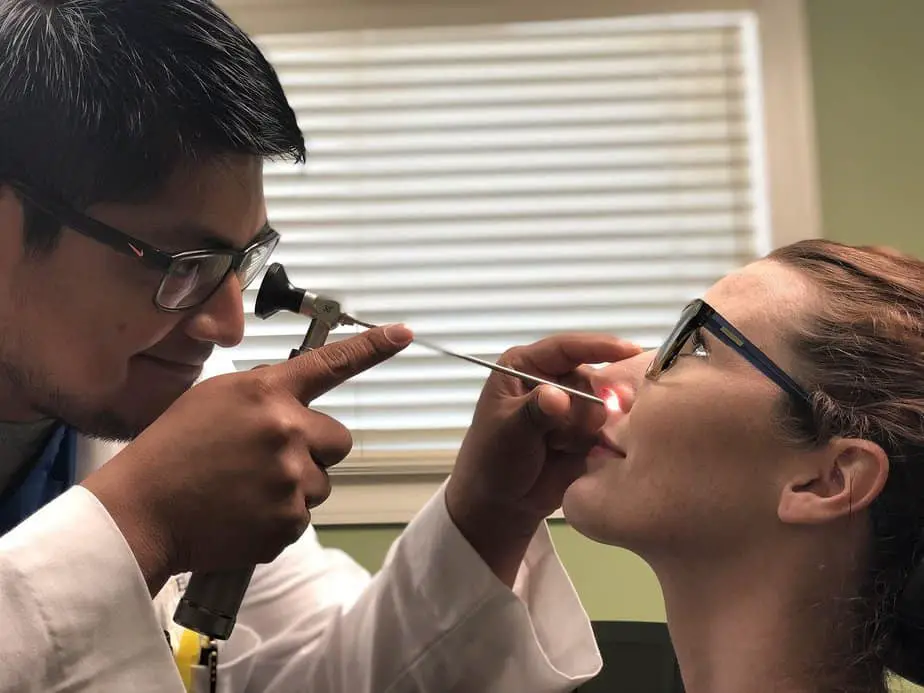
If you’re not sure what a sinus infection is, then you wouldn’t even know if you’ve had it, so we need to discuss that first.
A sinus infection, also known as sinusitis, refers to when your sinuses become swollen and inflamed.
There are four main sinuses connecting air spaces in your head. There are sinuses above the eyes (frontal sinuses) and two below (maxial sinuses).
Typically, fluid drains from these spaces. However, if fluid remains in there for some reason, bacteria can start to multiply and infect the sinuses. If the infection spreads to the nose tissues, then it can cause rhinosinusitis.
The most common causes of sinusitis are bacterial and fungal infections, tooth infections, allergies, and nasal polyps. A sinus infection should be looked at by a doctor.
You may have sinusitis if you have the following symptoms:
- Headaches.
- Pain above and below the eyes.
- Pain behind the nose.
- Nasal congestion/discharge.
- Cough.
- Earaches.
- Jawaches.
How can snorkeling cause a sinus infection?
Inhaling seawater
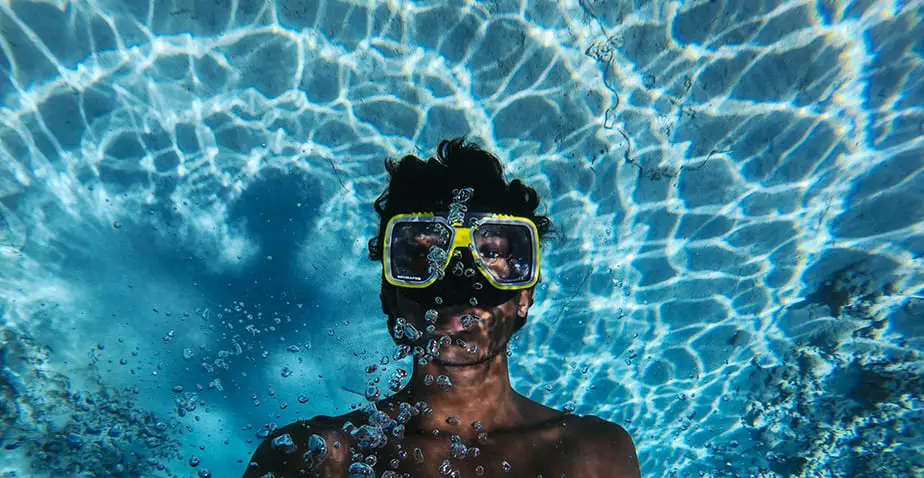
If you inhale or choke on saltwater and water enters the sinuses, then it can cause the soft tissues to swell up and get inflamed. Unfortunately, the saltwater you’re swimming in is likely polluted, especially if you’re in a tourist destination.
We cannot know for sure how many businesses are operating in an eco-friendly way or not, but it’s quite common for snorkeling tour boats to simply dump their waste into the waters. Also, other land-based businesses may also dump their waste into the waters, causing coral reefs and marine life to die, and poor snorkelers to get sick.
The bacteria in saltwater can cause a sinus infection. Similarly, the chlorine used in swimming pools can also irritate sinus tissues, causing them to get inflamed. This can create spaces for bacteria to linger and multiply, resulting in infection and inflammation.
Barotrauma from skin diving
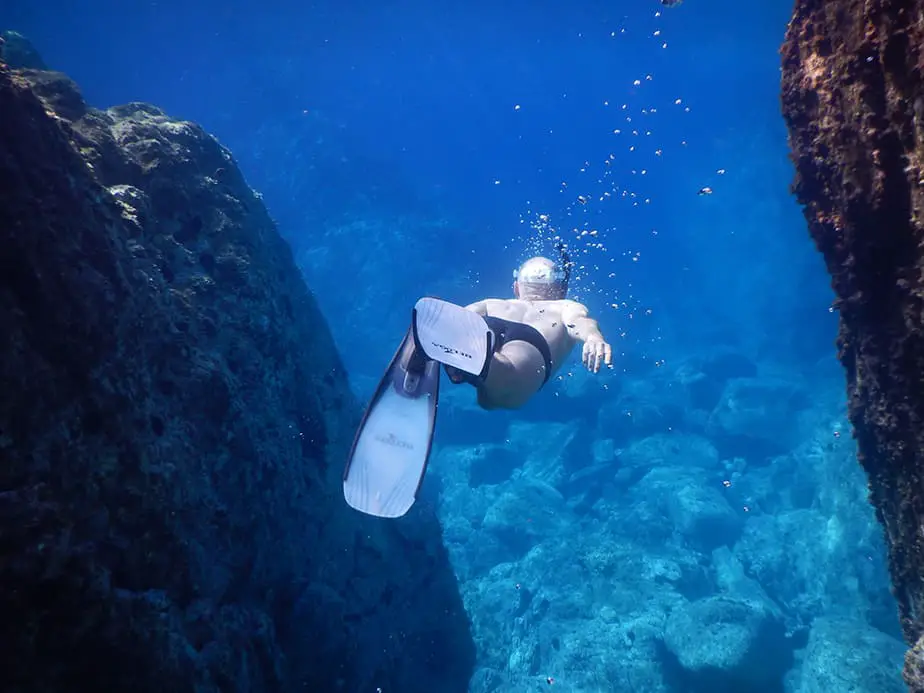
Barotrauma is an injury caused by pressure, and is most commonly associated with scuba divers and freedivers. Adventurous snorkelers who are not content with remaining by the surface can take a page from freedivers and do a skin dive (breath-hold dive) to get a closer look at something.
As soon as you submerge yourself, you will experience water pressure. The deeper you dive, the stronger the pressure gets. The pressure can be felt in your mask, ears, and sinuses because these pockets of air are getting compressed. To alleviate the pressure, you must learn to equalize your mask, ears, and sinuses.
The oft-repeated rule is to equalize early and often. You should not wait until the pressure becomes uncomfortable to equalize, otherwise you risk suffering barotrauma. You will feel the mask squeeze tightly against your face, your eardrums will feel like they might burst, and pain in your sinuses if you fail to equalize.
When you experience sinus barotrauma, fluid will enter the sinuses in response to the compression of air. The fluid will accumulate and cause inflammation and infection.
Should you have a runny or bloody nose after skin diving, then you most likely have sinus barotrauma and you might get a sinus infection.
Aren’t saline rinses good for you?
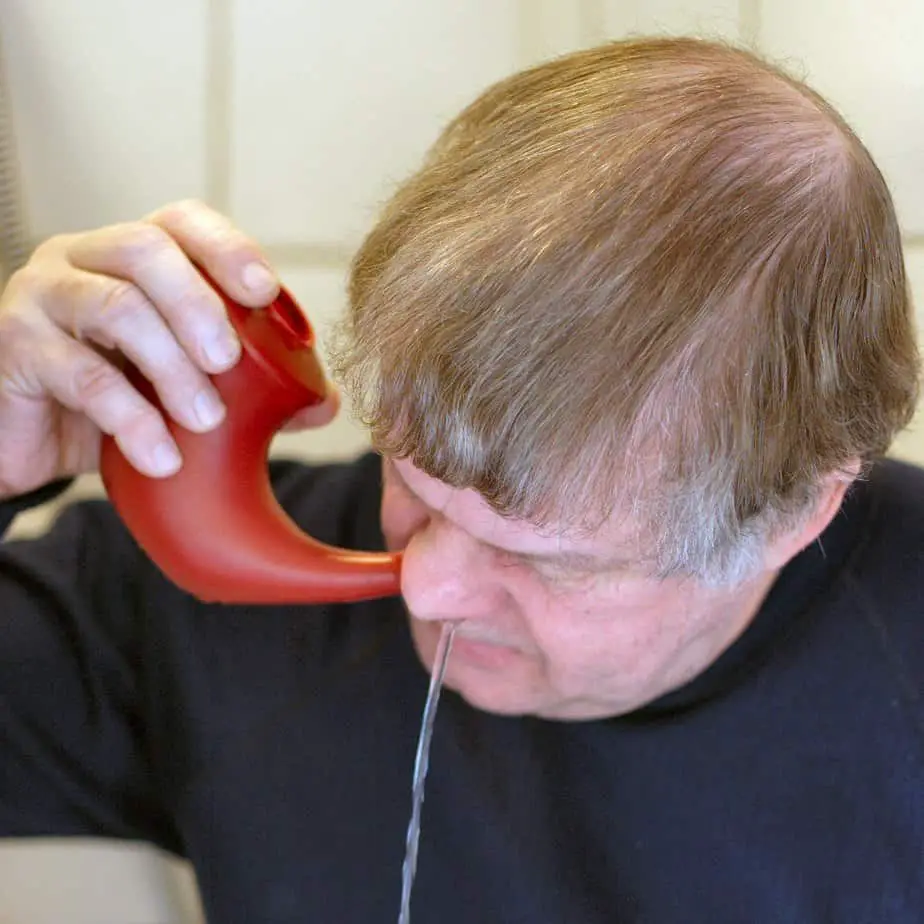
People commonly use neti pots to treat their allergies and sinus blockages. The saline rinse they use is technically just saltwater, so why is getting seawater in our sinuses so bad? The difference is in how sterile the water is.
We’ve already discussed how polluted and bacteria-filled seawater can be. A saline rinse, on the other hand, contains sterile water and measured doses of sterile salt so as not to worsen the irritation. Thus, the saline rinse used in neti pots does not introduce any bacteria and will soothe your sinuses.
On the other hand, the polluted seawater can cause irritation and cause infection by introducing bacteria.
How often do snorkelers get sinus infections?
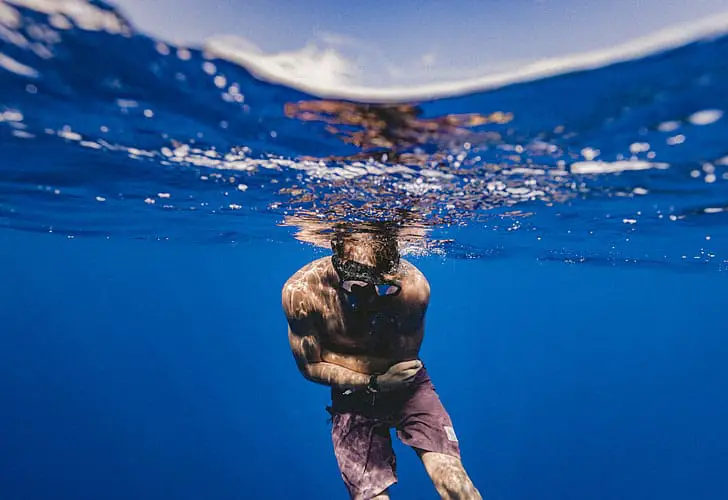
Considering how many millions of people enjoy snorkeling every year, the corresponding number of sinus infections are low indicating that it’s quite rare to get sinusitis.
With that said, beginner snorkelers and non-swimmers are more likely to get a sinus infection because they are the group that are more likely to get water in their mask and into their sinuses. Oftentimes, the cause of a mask leaking is due to facial hair breaking the mask’s seal. You can learn more about how to wear a dive mask with a beard and mustache by reading this article.
Additionally, someone who is not familiar with proper snorkeling technique or who are not strong swimmers are more likely to inhale water in general. Also, an adventurous youngster is more likely to start duck diving without knowing how to equalize.
Look, even though snorkeling is not particularly difficult, you should still know the basics. That way, you can reduce the chances of inhaling or choking on water and prevent sinus infections and sore throats.
What do I do if I am having sinus problems while snorkeling?
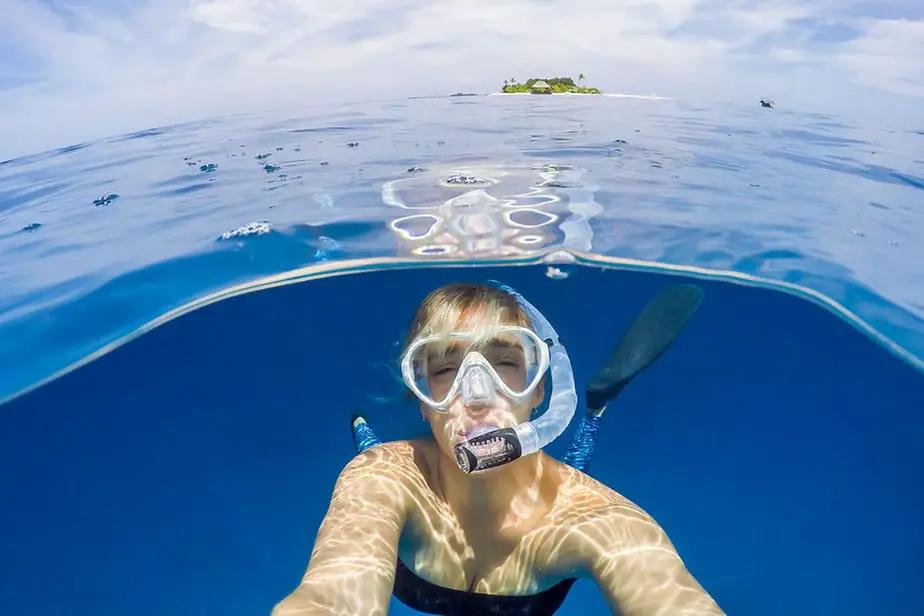
It’s hard to say if your sinus problems means you have a sinus infection, but it’s likely you inhaled some saltwater. If you experience pain in your sinuses while skin diving or have mucus blocking your nose then these are common symptoms of sinusitis. If your nose is bloody, you may have suffered a sinus barotrauma that may lead to infection.
The first thing you should do is get out of the water immediately. Do not continue snorkeling. The horizontal position maintained while snorkeling prevents liquid from draining from your sinuses, plus you can get even more bacteria in it, so exit the water immediately.
Next, if possible, find a jug or pot with a spout. Fill it with warm, salted water. You are going to rinse your nose using this makeshift neti pot. It can clear up the accumulated mucus, soothe irritation, and possibly unblock your nose. This is about all you can do on your own. Consider seeing a doctor for medical attention, infections are quite serious.
Can I snorkel with a sinus infection?
We understand the desire – you are on vacation and you don’t want to waste any precious days. However, ignoring your sinus infection to do even more snorkeling is not a good idea. It may expose your sinuses to even more bacteria and can be a serious health risk. Plus, it likely won’t be any fun since there is an infection weakening your body.
Furthermore, any infection that occurs in your head can travel to your brain and be lethal, so take head infections seriously. Take a few days off, go see a doctor, and make sure you’re feeling better before you head back into the water.
Tips to avoid sinus infections while snorkeling
Snorkel in calm waters
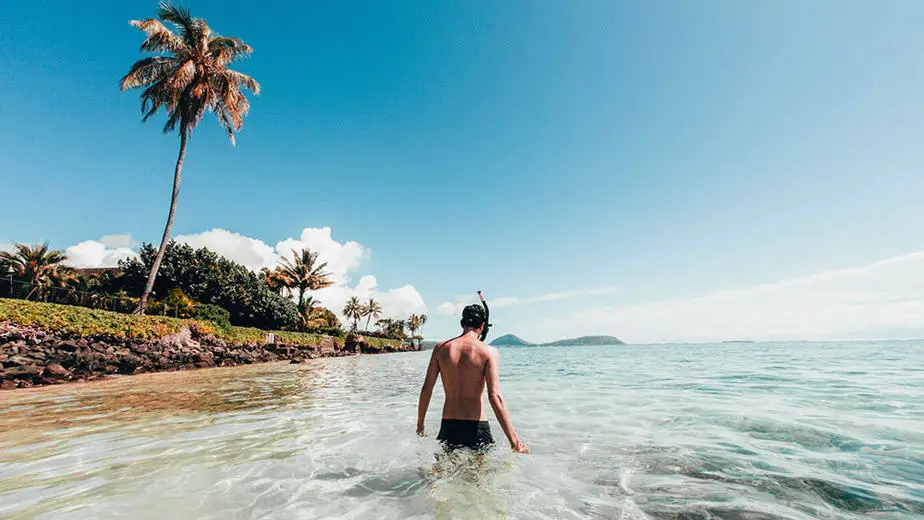
Inexperienced snorkelers and people who do not have a swimming background need to start off in calm waters. We recommend practicing in a protected bay, lagoon, or even just a shallow swimming pool to start. These areas are not affected by the weather conditions as much if at all, which makes them the ideal starting point.
The goal here is to practice basic snorkeling techniques like clearing your mask and snorkel. You can also practice floating horizontally and on your back. If you are not familiar with how to do these things, then you are more likely to inhale water and get a sinus infection. You are also putting yourself at risk of drowning, so put a lot of effort into the basics.
You might be tempted to start off in shallow waters by the shore, but we don’t recommend it. The weather and sea conditions can change rapidly. It might start raining or get windy, and this can affect the waves and currents. Riptides can drag people to their deaths even in shallow water.
Whether you’re a beginner or a pro, you should always be wearing some kind of buoyancy aid, whether that be a life jacket or snorkel vest. This is to help you stay afloat and conserve energy. If you are struggling to stay afloat or if the waves pick up, you can easily inhale water accidentally without a flotation device.
Master your snorkeling equipment
We touched on this briefly above, but you need to get really good at clearing your mask. What happens if water enters your mask or it starts fogging up? It doesn’t matter how well your mask fits or if you treat it with anti-fog, at some point water will leak in and the lens will fog up. How do you clear your mask?
Essentially, you crack open the seal just a little bit from the bottom and let water rush in to rinse the mask lens. Then you forcefully exhale from your nose and this should clear the water right out. Check out this video below for a visual of exactly what to do to clear your mask.
Mask clearing is extremely useful if you want a smooth snorkeling experience. Otherwise, there will be a major disruption in your snorkeling if you need to remove the mask from your face and manually rinse the mask with your hands.
Unfortunately, some struggle to clear their mask and just end up with a noseful of water which can lead to a sinus infection. It’s why we recommend starting out in a protected area so you can practice mask clearing in calm waters.
Stay within your limits when skin diving
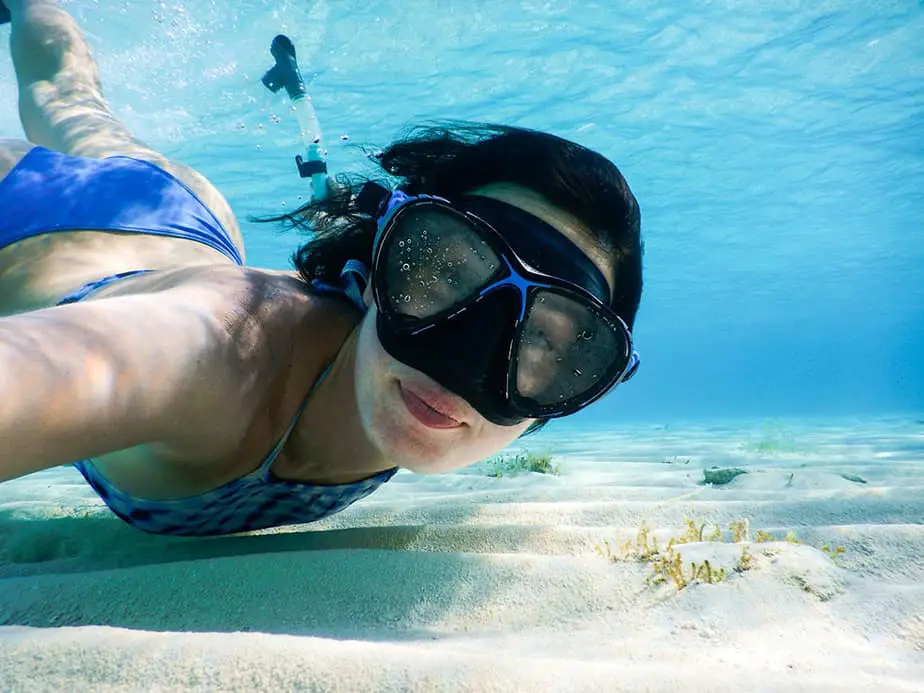
It can be really fun to get a closer look at something, but you need to start slowly and learn how to equalize the pockets of air in your head. As we mentioned, a sinus barotrauma can lead to an infection, so you want to be a pro at equalization.
The golden advice is to equalize early and often. That means if you feel pain in your mask, ears, and sinuses, you should have already equalized.
The most basic way to equalize is to use the Valsalva maneuver. You probably already know this, but it’s when you pinch your nose and gently exhale through your nostrils. That should clear your ears and sinuses. To equalize your mask, simply exhale from your nose (don’t pinch it this time).
When you’re having problems equalizing, don’t dive any further. Ascend higher and see if you can equalize. If you still can’t, head back to the surface. You don’t want to suffer a barotrauma, whether it be a sinus barotrauma or anything else.
Stay warm
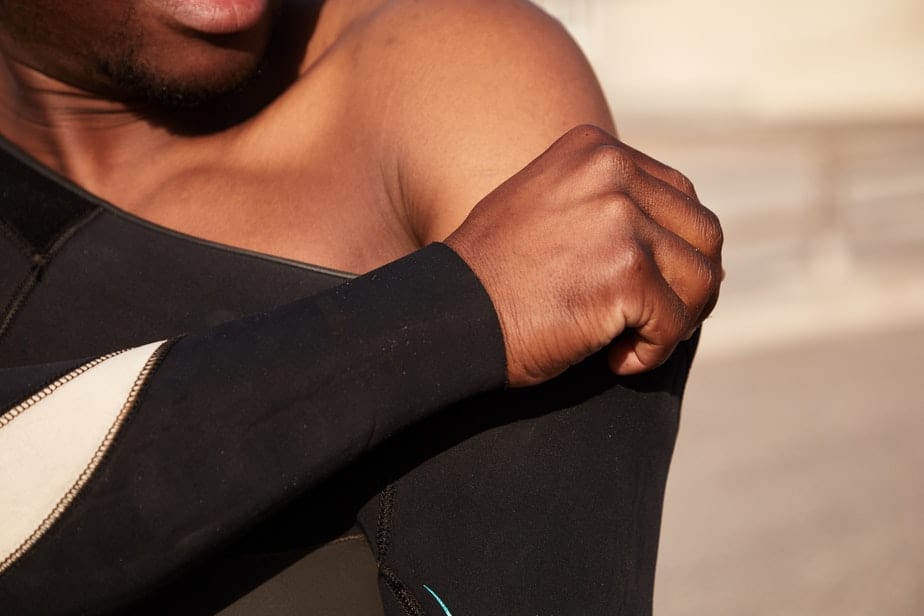
You’re probably at a tropical destination where it’s really hot and the waters are warm. Yet, people are often shocked that they end up shivering. Why is that?
Water is incredibly good at conducting heat away from the body (about 25x more effective than wind). Plus, if you’re wet and you get exposed to the wind, you can feel extremely cold.
When you’re cold, the sinuses will be more sensitive. Your immune system will also be weaker when you’re cold, making you more susceptible to illnesses and infection. So wear an appropriate exposure suit or limit the amount of time you spend in the water before you get too cold.
Parting words
Even though it is technically possible to get a sinus infection from snorkeling, it is highly unlikely, especially if you are well-prepared.
Beginners are the most likely to get a sinus infection. Inhaling dirty seawater can expose your sinuses to bacteria, resulting in inflammation or infection.
Getting a well-fitting mask and knowing how to properly clear the mask of water can keep you from inhaling saltwater.
Knowing how to equalize when duck diving can also prevent a sinus barotrauma which can get infected, leading to sinus infection. Dive cautiously and within your limits.
If you do get a sinus infection, you need to seek medical attention immediately. Do not continue snorkeling. Take the time off to let your body recover. Yes, it sucks your vacation days are being wasted but it’s better than the alternative. Your health is one of the most important things you have so don’t compromise on it by ignoring an infection.

